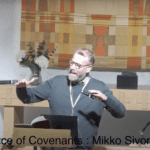This is also available in Finnish.
Reading books has declined significantly in the Nordics, including here in Finland. This applies to the general reading of the Bible as well, resulting in fewer people knowing biblical texts and stories. Even where the Bible is read, its teaching is often superficial, unclear, and inconsistent. In many churches, knowledge of biblical texts and understanding of its message can be very minimal.
To understand the Bible correctly, we must read its texts carefully. The relationship between words, sentences, and paragraphs cannot be ignored. These form the special message of each book through which we get to know our Creator and Redeemer. Equally important are the categories of systematic theology that emerge from the Scriptures. Creeds and catechisms, for example, can help to give people understanding of historic doctrines. However, understanding and use of even these excellent tools are not sufficient for a person to know the living God fully.
The need for biblical theology
We need biblical theology. During the last 20–30 years, biblical theology has gained more weight in the literature and teaching arising from both the academic and church context.1 This has been a positive trend, which, admittedly, has not yet reached the Finnish dialogue in all its potential.2 Biblical theology acts as a bridge between careful examination of Scripture and systematic theology. It shows us the whole story of the Bible where the Creator reveals himself.
God reveals his character through stories that take place in actual history.
God reveals his character through stories that take place in actual history. Therefore, the Scriptures are not just random religious stories or sources of inspiration, but one great narrative, each episode of which is crucial to its overall understanding. This narrative grows, develops, and unfolds progressively towards its final climax. Biblical theology does not focus on the moral teaching of smaller narratives. The story itself and how it is told shapes our understanding of the Lord’s character and his faithfulness to his people.
The biblical narrative as organic revelation
The biblical narrative is not just any story. In it, God progressively reveals parts of himself throughout history and that revelation grows organically like a tree growing from seed. He includes us in the narrative. It is not an inspirational story in essence. It is a story about reality: about what he is like.
The Bible talks about God and his presence among his people.
The Bible talks about God and his presence among his people. In order to reveal this reality, the Author creates a real world in which he reveals himself through historical events, various text genres, language images, and the people he chooses. The core plot revolves around a king and his kingdom. This relationship between God and creation is described through several themes. The Bible, with its different types of texts, tells of the reality in which the goodness and holiness of the Creator God is brought out in relation to the created.
Thematic progression in the biblical narrative
Biblical theology can help us trace certain themes that run like a red thread or a growing progression through the Old and New Testament texts. The Creator uses a variety of themes to reveal himself and his salvation story. One of the most important intersections in the Bible is God’s character and glory displayed in his image, and the restoration of that glory after the Fall through the image and glory of his own Son.3 The Lord also makes himself known in the relationship between the shepherd4 and his sheep. Marriage, the temporal union between a man and a woman, ultimately serves as a window into the eternal covenant between the Lord and his people, between Christ and the Church. The Lord also reveals himself through the temple theme,5 which pervades the biblical story from its opening pages to the final book. The overall narrative of the Bible also discloses the priestly-royal role God gave man in governing creation. The sacrifice required to atone for man’s shame and sin and to restore the justice of the good God is also no side story: its roots go back to Genesis 1 and continue right up to the “slain lamb” of Revelation.
Covenants are foundational
In addition to the themes mentioned above, the covenants permeate and define the relationship between the King and his subjects.6 There are six covenants in the Bible, all of which speak of the relationship between the Creator and the created. God makes a covenant with Adam (creation), Noah, Abraham, Moses, and David. In addition to these, the prophets speak of a new covenant that the Messiah will fulfill. The content of these covenants and the relationships between them are of paramount importance for understanding the plot of the biblical narrative.
The Bible tells a single, coherent story with many episodes and themes. The seeds found in the Old Testament grow into trees that bear fruit in the New Testament revelation. All the themes ultimately tie into the Lord and the redemption of his people through his son Jesus Christ. This unfolding story makes the study, teaching, and preaching of the Bible meaningful, truthful, and transformative. The face of our Lord Jesus Christ is unveiled for the praise of God and the joy of his people.





